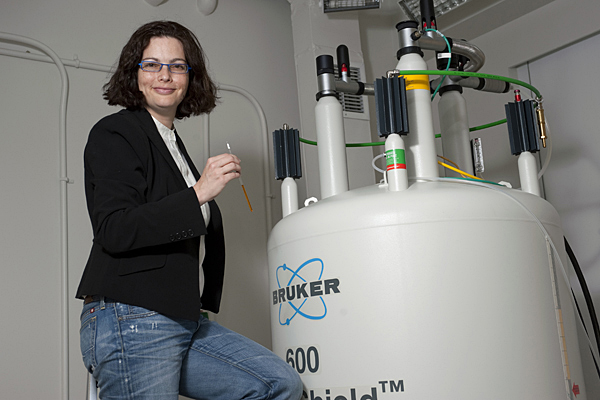
NSF Career Award
Sharon Rozovsky receives prestigious national award for research on proteins containing selenium
3:02 p.m., March 22, 2011----Sharon Rozovsky, assistant professor in the Department of Chemistry and Biochemistry at the University of Delaware, has received a prestigious Faculty Early Career Development Award from the National Science Foundation (NSF) to support her research on proteins that contain selenium.
The highly competitive award recognizes junior faculty for their role as teacher-scholars and is given to those scientists and engineers considered most likely to become the academic leaders of the 21st century. The NSF Career Award, which includes an $800,000 grant, will support Rozovsky's research and education program at UD on selenoproteins.
Research Stories
Chronic wounds
Prof. Heck's legacy
“You have thousands of proteins in the human body, and only 25 contain selenium, so that suggests that selenium has a very special role,” Rozovsky said. “It's important for preventing cancer and also for longevity, so we want to understand how it functions.”
Her research looks at enzymes, which are proteins that accelerate chemical reactions, and how they “fine-tune” their activities so that they bind only to specific reaction partners and accelerate only certain reactions. Rozovsky particularly focuses on enzymes that use selenium and that work as antioxidants in the human body.
“When cells make energy -- through normal living -- they produce oxygen, and that can damage the cells,” she said, explaining that as that damage accumulates over years, it can result in diseases such as cancer and Alzheimer's. Selenium containing proteins can help to both slow and prevent that damage, she said. “Some proteins prevent the damage from happening; they're like police,” Rozovsky said. “Others are like reporters; they transmit the message [known as signaling] to the cells that the level of reactive oxygen is too high.”
The benefits of Rozovsky's research project extend even further by exposing a wide range of students to biochemistry and to science in general. One way in which Rozovsky hopes to interest more students in pursuing graduate studies and careers in science is by offering an intensive summer program targeted to undergraduates with disabilities. She and Karl Booksh, professor of chemistry and biochemistry, are exploring ways to implement such a project at the University of Delaware, in which students would receive career guidance, networking and mentoring opportunities to encourage them to continue pursue a career in science or engineering.
Although Rozovsky's research studies the cellular processes involving proteins with selenium, she said the NSF especially noted the fact that the project has broader implications, with the potential to discover more about how other proteins function, as well.
Article by Ann Manser
Photo by Kathy F. Atkinson









